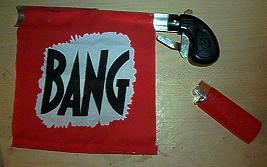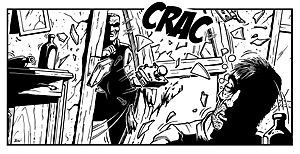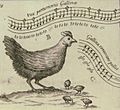Onomatopoeia facts for kids
An onomatopoeia (say it: oh-nuh-mat-uh-PEE-uh) is a word that sounds like what it describes. Think of words that imitate noises, like a bee's buzz or a dog's woof. The word itself is also called an onomatopoeia.
Many animal sounds are onomatopoeia, such as oink (for a pig), meow (for a cat), roar (for a lion), and chirp (for a bird). These words help us imagine the sound just by reading them.
Here are some common examples of onomatopoeia:
- buzz – the sound bees make when they fly.
- arf, woof, bark – sounds that dogs make.
- cuckoo – this bird's name comes from the sound it makes.
- zip – the sound a zipper makes when you close it.
Other everyday examples include hiccup, zoom, bang, beep, moo, and splash. Even sounds from machines often use onomatopoeia. For example, a car horn might honk or beep-beep, and an engine might go vroom.
Sometimes, human sounds are also onomatopoeia. For instance, mwah is used to describe the sound of a kiss.
Contents
Sounds Across Cultures
Even though people from different countries hear sounds in a similar way, they often write them down using different words. It's like how different languages have different words for "hello."
For example, the sound of scissors cutting, which we call snip in English, is written differently in other languages:
- In Italian, it's cri-cri.
- In Spanish, it's riqui-riqui.
- In Hindi, it's katr-katr.
The same goes for a car horn's honk. In Mandarin Chinese, it's ba-ba. In French, it's tut-tut, and in Japanese, it's pu-pu. This shows how languages adapt sounds to their own letters and pronunciations.
Onomatopoeia in Comics and Ads
Onomatopoeia is super popular in comic books and advertisements. It helps bring stories and products to life!
Comics Come Alive
Comic books use lots of onomatopoeia to show sounds. Think of words like bam, pow, and wham that you see next to a superhero's punch. A famous artist named Roy Crane was one of the first to use these sound effects in comics. He even made up fun ones like ker-splash! These words made the action feel faster and more exciting.
In 2002, DC Comics even created a bad guy named Onomatopoeia. This villain is a skilled fighter who only speaks in pure sounds, like CRACK! or THWIP!, which makes him very unique.
Catchy Ads and Jingles
Advertisers use onomatopoeia to help you remember their products. It's like a catchy tune that sticks in your head.
- The medicine Alka-Seltzer had a famous jingle: "Plop, plop, fizz, fizz. Oh, what a relief it is!" The words plop and fizz sound exactly like the tablet dissolving in water.
- Rice Krispies cereal makes a "snap, crackle, pop" sound when you pour milk on it. These words are so famous that the cereal even has mascots named Snap, Crackle, and Pop!
- Road safety ads also use sound words. In the UK, a campaign said "clunk click, every trip" to remind people to close the car door (clunk) and fasten their seatbelt (click).
- The small mints called Tic Tac got their name from the sound their container makes when you open and close it.
Images for kids
See also
 In Spanish: Onomatopeya para niños
In Spanish: Onomatopeya para niños
 | Sharif Bey |
 | Hale Woodruff |
 | Richmond Barthé |
 | Purvis Young |





